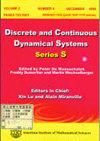非药物干预和加强剂量依从性与COVID-19缓解的随机性
IF 1
4区 数学
Q2 MATHEMATICS, APPLIED
引用次数: 0
摘要
面对更具传染性的COVID-19变体Omicron,非药物干预措施(npi)仍然存在,并提出加强剂量以减轻疫情。然而,个体对npi和加强剂行为的不确定性和随机性增加,以及这种随机性如何影响传播仍然知之甚少。我们提出了一个模型框架,将人口统计学随机性和两种环境随机性(特别是对npi的依从性和加强剂量接受度的变化)结合起来,分析不同形式的随机性对传播的影响。该模型使用2021年12月31日至2022年3月8日的数据进行校准,这些数据包括加拿大多伦多每日报告的病例和住院病例、累积病例、死亡病例和加强剂量疫苗接种。采用近似贝叶斯计算(ABC)方法进行标定。我们观察到,与相应的确定性模型的结果相比,人口统计学随机性可以显著恶化疫情,发生率更高。我们发现,npi依从性的巨大差异增加了感染。增强剂接受的随机性不会显著影响报告病例数,在缓解COVID-19方面是可以接受的。与增强剂剂量犹豫相比,npi依从性的随机性需要更多的关注。©2023美国数学科学研究所。版权所有。本文章由计算机程序翻译,如有差异,请以英文原文为准。
The stochasticity in adherence to nonpharmaceutical interventions and booster doses and the mitigation of COVID-19
Facing the more contagious COVID-19 variant, Omicron, nonpharmaceutical interventions (NPIs) were still in place and booster doses were proposed to mitigate the epidemic. However, the uncertainty and stochasticity in individuals' behaviours toward the NPIs and booster dose increase, and how this randomness affects the transmission remains poorly understood. We present a model framework to incorporate demographic stochasticity and two kinds of environmental stochasticity (notably variations in adherence to NPIs and booster dose acceptance) to analyze the effects of different forms of stochasticity on transmission. The model is calibrated using the data from December 31, 2021, to March 8, 2022, on daily reported cases and hospitalizations, cumulative cases, deaths and vaccinations for booster doses in Toronto, Canada. An approximate Bayesian computational (ABC) method is used for calibration. We observe that demographic stochasticity could dramatically worsen the outbreak with more incidence compared with the results of the corresponding deterministic model. We found that large variations in adherence to NPIs increase infections. The randomness in booster dose acceptance will not affect the number of reported cases significantly and it is acceptable in the mitigation of COVID-19. The stochasticity in adherence to NPIs needs more attention compared to booster dose hesitancy. © 2023 American Institute of Mathematical Sciences. All rights reserved.
求助全文
通过发布文献求助,成功后即可免费获取论文全文。
去求助
来源期刊

Discrete and Continuous Dynamical Systems-Series S
MATHEMATICS, APPLIED-
CiteScore
3.70
自引率
5.60%
发文量
177
期刊介绍:
Series S of Discrete and Continuous Dynamical Systems only publishes theme issues. Each issue is devoted to a specific area of the mathematical, physical and engineering sciences. This area will define a research frontier that is advancing rapidly, often bridging mathematics and sciences. DCDS-S is essential reading for mathematicians, physicists, engineers and other physical scientists. The journal is published bimonthly.
 求助内容:
求助内容: 应助结果提醒方式:
应助结果提醒方式:


